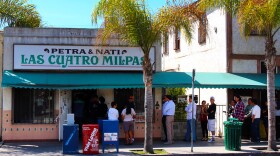

After simmering for nine years, the problem of Kosovo is once again coming to a boil. The province declared its independence from Serbia on Feb. 17.
Although the area has relatively limited strategic or economic importance to the rest of the world, major nations are taking sides over it. It's a dispute that tests the limits of United Nations power, national sovereignty and the hopes of ethnic minorities.
The United States and Britain are among the nations that support Kosovar independence. Russia and China oppose it. One important factor in where countries stand is whether they have separatist movements of their own.
Here are some of the questions raised by the prospect of nationhood for Kosovo:
Why does the United States support independence for Kosovo?
"Kosovo has a very special place for the United States in its diplomacy," says Frank Wisner, the American representative to the Kosovo talks. That is because of the former Serbian government's so-called "ethnic cleansing" campaign of the 1990s, he says. The International Criminal Tribunal for the former Yugoslavia reported that Serbian military and paramilitary groups killed thousands of people in an effort to drive out the ethnic Albanians who made up most of Kosovo's population.
Encouraged by the United States and Britain, NATO launched a bombing campaign in 1999. It eventually forced the Serbian military to withdraw from Kosovo, but not before hundreds of thousands of ethnic Albanians had been driven from their homes.
Can't the Serbs and the ethnic Albanians work out some sort of compromise?
The divisions are deep and bitter. "We've been working to get a negotiated settlement for two years," says Wisner, "and there's no agreement to be found." He adds that years of Serbian repression and the attempted "ethnic cleansing" produced an "unbridgeable gap" between the two sides. "You can't force 90 percent of Kosovo's population to return to Serbian rule," he says.
The ethnic Albanians also committed atrocities against Serbs living in Kosovo, so the bitterness extends to both sides. Serbs historically have seen Kosovo as their cultural and religious heartland, and it's a focus for intense nationalism.
Robert Hayden, who directs the University of Pittsburgh's Center for Russian and East European Studies, says one solution that was never properly explored is the possibility of dividing Kosovo along ethnic lines. He cites a partition plan that was suggested by some ethnic Albanians in the 1990s. That would have given Serbia the majority-Serb areas north of the divided city of Mitrovica, and guaranteed protection for Serbian religious and cultural sites that remained on the ethnic-Albanian side.
Wisner asserts that the ethnic Albanians would never have accepted partition, and that the issue never came up during the status talks.
Why do some think Kosovo's independence must happen now?
Since the bombing campaign in 1999, Kosovo has been protected by mostly NATO troops and administered by the United Nations. "Now, nine years later," Wisner says, "the matter has to be settled. The United Nations can't remain there indefinitely."
Supporters also maintain that Kosovo will never be able to develop economically until its political status has been settled. Charles Kupchan, a senior fellow at the Council on Foreign Relations, says one reason the Bush administration pushed for an independence declaration is that officials felt that the World Bank and international investors would not go into Kosovo until they had a sense of finality. He says a conclusive settlement could also attract more investment from ethnic-Albanian Kosovars who live and work abroad.
Which other countries back Kosovo's independence?
Britain, France, Italy, Australia, Austria and Germany are among the nearly 20 countries that have said they would extend diplomatic recognition to Kosovo. Their partners in the European Union, though, have been unable to reach consensus. Afghanistan was among the first countries to support Kosovar independence. That may be because the Afghan government, like that in Kosovo, owes its existence to a U.S.-led intervention, and Afghans, like the ethnic Albanians, are Muslim.
Some of the supporters of Kosovo have separatist ambitions of their own. They include Taiwan, which is struggling to maintain its autonomy from China, and Northern Cyprus, where ethnic Turks declared their independence in the early 1980s.
Which countries reject Kosovo's independence declaration?
Russia, which has strong ties to Serbia's government, is a key opponent, along with China, which has separatist concerns over Taiwan. Both nations, like the United States, are permanent members of the U.N. Security Council — meaning they can veto any effort to give U.N. endorsement to Kosovo's independence.
Spain, Greece, Romania, Bulgaria, Slovakia and Cyprus have all questioned the legality of Kosovo's declaration. All are involved in separatist issues of one kind or another, such as Spain's long-running conflict with some members of its Basque minority.
Kupchan says he doesn't think Kosovo's independence is likely to set a precedent for most other nations that have restive minorities, but he says it could affect areas nearby. "There are three main areas of concern," he says. "There's the possibility that Serbs in northern Kosovo could secede from Kosovo and rejoin Serbia; and there could be secession moves among ethnic Serbs in Bosnia and ethnic Albanians in Macedonia."
What are some of the arguments against Kosovo's declaration of independence?
Opponents say the unilateral declaration violates United Nations principles. The University of Pittsburg's Hayden argues that it violates the fundamental idea that "national borders cannot be changed by force and without the consent of all the parties involved." Hayden says that was the principle under which President George H.W. Bush went to war in 1991 to oppose the Iraqi invasion of Kuwait.
Wisner, the American representative to the Kosovo status talks, acknowledges that U.N. Resolution 1244, which ended the violence in 1999, said the future of Kosovo was to be settled by the United Nations. But he says the Russian veto threat made any such settlement impossible.
Copyright 2022 NPR. To see more, visit https://www.npr.org. 9(MDAzMjM2NDYzMDEyMzc1Njk5NjAxNzY3OQ001))






